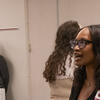Build Your Personal Brand
Creating and maintaining a personal brand is a key piece to successful career development in the age of social media. A personal brand is an authentic portrayal of you – your values, passions, skills, knowledge, and personality – and can help to set you apart from others in your major and industry.

